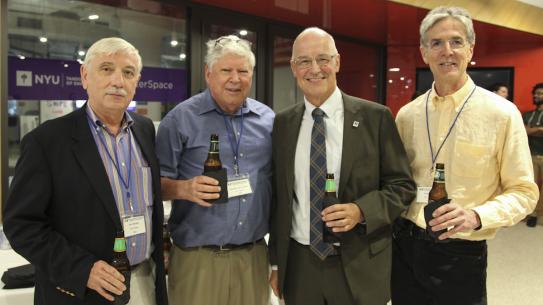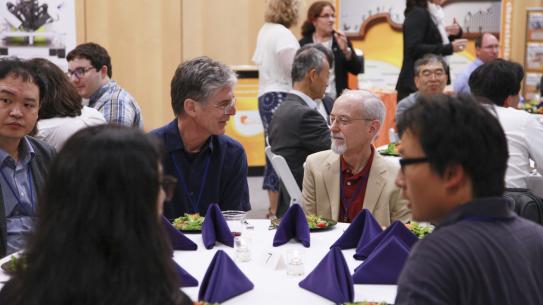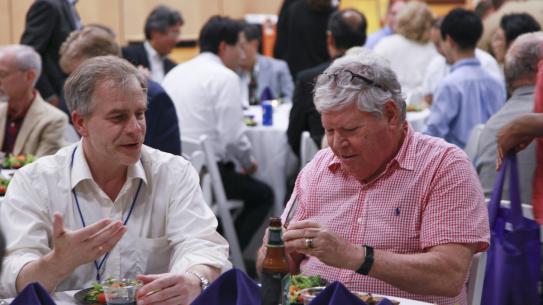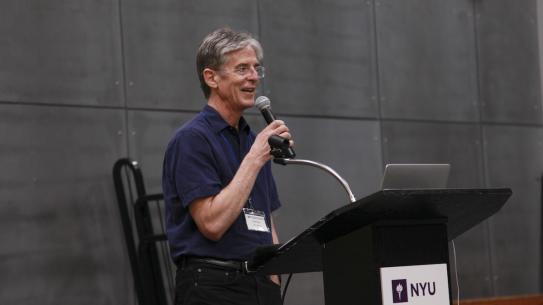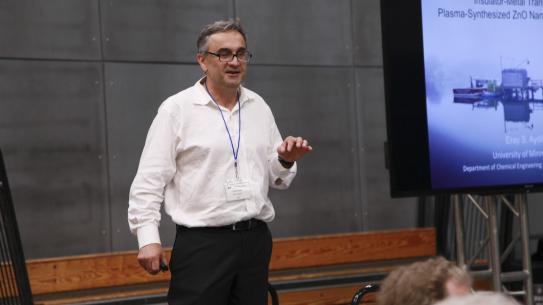The World’s Leading Experts in Organized Molecular Films Gather in Brooklyn
The NYU Tandon School of Engineering Hosts ICOMF17
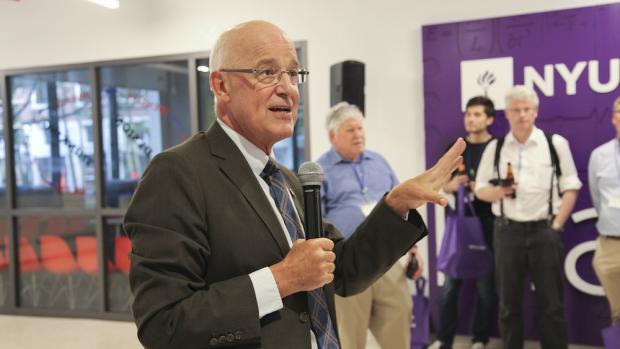
NYU President Andy Hamilton speaks at the International Conference on Organized Molecular Films in front of NYU Tandon's Makerspace.
In 1983, in the picturesque British town of Durham, a small group of researchers gathered for the first-ever conference devoted to Langmuir-Blodgett films, exceptionally thin organic films created by transferring monolayers from the air-water interface onto a solid substrate. The films, which have uniform surfaces and a high degree of orientational order (meaning that their molecules are positioned in the same direction), have great utility in electronic devices and sensors, and experts at that initial conference were eager to share their research findings and set a course for future work. (The films were named for Irving Langmuir, a Nobel laureate honored for his work in surface chemistry, and fellow researcher Katharine Burr Blodgett, the first woman to be awarded a Ph.D. in physics from the University of Cambridge.)
Now, 35 years later, the LB Conference, as it was known, has grown into a major global forum covering the entire field of organized films. Renamed the International Conference on Organized Molecular Films (ICOMF) 17 years ago, it continues to draw luminaries in the field, and this year, the event was organized and chaired by NYU Tandon Professor of Chemical and Biomolecular Engineering Avi Ulman, whose own research focuses on self-assembled monolayers, surface engineering, and interfacial phenomena; polymers at engineered interfaces; nanoparticles; and drug delivery.
“Organized molecular films have become one of the cornerstones in many research fields, such as fundamental chemistry and physics, nanoscience and technology, and biomimicking systems, to mention just a few,” Ulman explains. “The multidisciplinary nature of studies of organized molecular films requires scientists from various fields to collaborate in ways rarely found in other fields, so the ICOMF serves as an excellent forum, where chemists, physicists, biologists, material scientists, polymer scientists, chemical engineers, and researchers from academy, national research institutes and industry gather to discuss their latest results. This combination of cutting-edge science and the opportunity to exchange ideas and forge collaborations has long made this conference a highly successful biennial series, and it’s gratifying to be organizing and hosting it this year at NYU Tandon.”
NYU President Andrew Hamilton, who addressed attendees on the event’s opening night, concurred. “As a chemist myself, I know well the importance of this field and the excitement of the research that will be presented over the course of the next few days, and as a university president, I couldn’t be more pleased to be holding a conference like this one,” he asserted. “This event celebrates the strength and trajectory of Tandon, as well as the power of chemistry to change the world.”
As Hamilton predicted, ICOMF included a plethora of exciting and high-level discussions of such topics as colloids, translational biomaterials, bionano interfaces, and tissue engineering, which had been added to the traditional ICOMF discussion topics.
Among the Tandon presenters were:
- Chairman of the Department of Chemical and Biomolecular Engineering, Silver Professor, and Professor of Physics and Mathematics David Pine, an expert in the physics of soft mesoscopic materials such as colloids and emulsions. Pine, a fellow of the American Academy of Arts and Sciences, is also an American Chemical Society Langmuir Lecturer, a post named in honor of Irving Langmuir.
- Assistant Professor of Chemical and Biomolecular Engineering Ryan Hartman, who investigates flow chemistry with microsystems using chemical reaction engineering principles for sustainable chemicals, energy, and healthcare.
- Professor Elisa Riedo, among the newest members of Tandon’s Department of Chemical and Biomolecular Engineering, who is particularly well known for her pioneering work in thermochemical nanolithography, a technique used to create nanoscale chemical patterns with applications in biomedicine, nanoelectronics, and magnetic materials.
- Professor of Chemical and Biomolecular Engineering Jin Kim Montclare, who is performing groundbreaking research in engineering and customizing proteins with the aim of targeting human disorders, drug delivery, and tissue regeneration, as well as creating nanomaterials for electronics.
- Associate Professor of Mechanical and Aerospace Engineering Nikhil Gupta, whose research focuses on processing and structure property correlation for particulate composites; additive manufacturing methods; fiber-optic sensors for damage sensing in materials; and biomaterials and bio-inspired materials.
At a special session on translational biomaterial chaired by Ulman, John T. McDevitt, the Chairman of Biomaterials and Biomimetics at NYU and a Professor in the School of Engineering’s Department of Chemical and Biomolecular Engineering, spoke about his work on a platform to digitize biological signatures using artificially intelligent sensors, pointing out that combination of point-of-care biosensors and machine learning has the potential transform the practice of medicine, and that scalable biosensors based on advanced biomaterials have many advantages over standard laboratory methods, including faster analysis, reduced cost, and lower power consumption.
The event’s major keynote was presented by new faculty member Eray Aydil, who arrives at Tandon following an illustrious tenure as head of an eponymous Photovoltaics and Plasma Research Lab at the University of Minnesota. Aydil’s talk concerned organized films comprised of ZnO nanocrystal networks (which are transparent and producible with conductivities spanning more than ten orders of magnitude) and addressed current gaps in our fundamental understanding of electronic transport in those films.
“It was thrilling to host speakers from around the globe, including those from such prestigious institutions as the Weizmann Institute of Science, Columbia University, Technische Universitaet Dresden, the Karlsruhe Institute of Technology, the University of Leeds, the University of Michigan, and Heidelberg University,” Ulman said. “But it was equally thrilling to hear from many of my colleagues from right here in Brooklyn. It confirms that NYU Tandon stands as a powerful force in the world of organized molecular films, and I expect that our reputation and reach will only continue to grow.”


